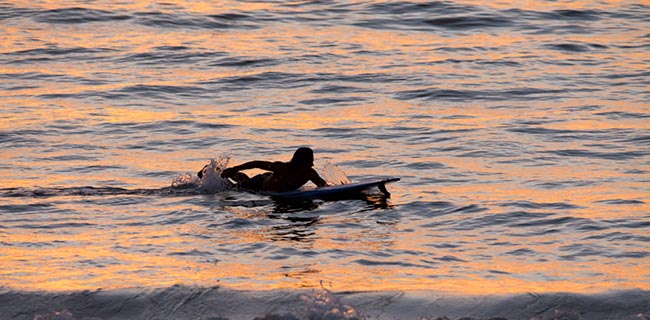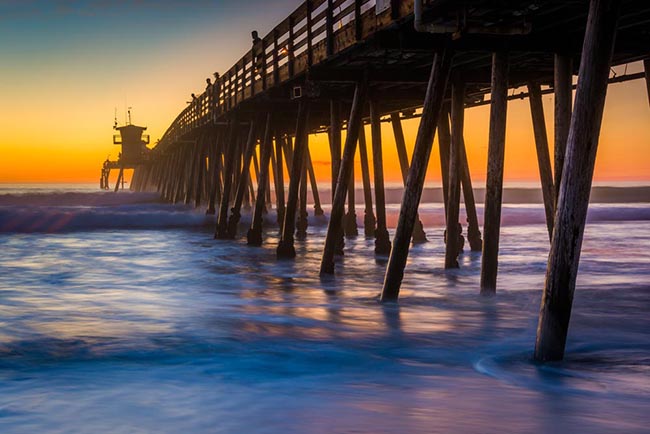
Photo: Ernesto J. Torres
Border Crossing On A Board
Talk to the local surfers and soon you will hear stories about how they or their friends paddled their way across the border from Tijuana to San Diego’s Imperial Beach. On a good night, the trip takes only two hours in the frigid, shark-infested open sea. But hopefully you don’t see any sharks, just dolphins and seals.
You must paddle lying down so that you aren’t spotted by the Coast Guard or Immigration. You wear a full-body wetsuit, boots, and, optionally, headgear to protect your face and gloves. A cell phone, cash, and a change of clothes are stashed in a plastic bag on your back.
You paddle out at night on a longboard about 500 meters from the shore — 100 meters beyond the waves — but the coast curves and sometimes you are in the waves. Obviously you have to be in good condition and know the ocean well. Or you might try it drunk on a body board.
Alfonso (all names have been changed) is famous in Puerto for crossing the border, inebriated, on his body board, passing out on the open sea and being rescued by the U.S. Coast Guard. The agents imagined they had found a drug shipment off-loaded at sea. In the end, he spent a month in jail and came back to Puerto with a good story.
If all goes well, you hit land near the first houses on Imperial Beach, around one km before the pier where your friends are waiting with a car. This is not always the case.

Rogelio had successfully paddled the border twice, when, in 2011, it seemed that his luck had given out. He was spotted by Immigration as he came ashore, forcing him to make his escape by running to the pier. There he shimmied up a pole as if it were a coconut palm and wedged himself between the walkway and a pipe that pumped water to the restaurants, gripping the screws that hold it in place. He sat there for four hours while a helicopter hovered above and over 20 Immigration and Coat Guard agents continued their search.
He had to cough, which would have given him away, and he licked the salt water from his wetsuit. This happened twice. They brought in a dog; the dog circled over his hiding place. But the agents thought he couldn’t possibly be in that spot. Finally, exhausted, Rogelio was about to give himself up when he heard one of the agents say he was going to beat up whoever was responsible for such a long and expensive operation. So he decided that if he was going to get beaten up anyway, it was better that they find him than for him to surrender.
In the end, it was the Immigration agents who gave up. But still it was not an easy walk to his friend’s house. First a car followed him. It was late at night, and there was every chance the driver might call the police. Rogelio hid in the bushes. Then he got lost. Finally, when he got to the house, a stranger came to the door and told him his friend was sleeping and he should come back later. It was 5 a.m., he had left Tijuana at 10 the previous night. Fortunately, his friend’s wife woke up and let him in. He had a hot bath, ate breakfast and slept for an hour.
Rogelio still had to find the two friends he had begun the crossing with. They had become separated in the ocean on the Mexican side. That morning he found one of the surfers walking along the highway. He had made it safely to the beach because just as he arrived he saw the Immigration police take off in a hurry, presumably in pursuit of Rogelio. Since his friend has white skin, he could pass as a homeless person and the police had not stopped him. Later that day he was able to reach his other friend, who was safe in Tijuana. He had decided not to risk the waves.










